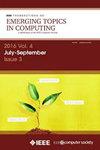基于社交网络的网络物理无线体域网络系统的干扰抑制
IF 5.1
2区 计算机科学
Q1 COMPUTER SCIENCE, INFORMATION SYSTEMS
IEEE Transactions on Emerging Topics in Computing
Pub Date : 2013-06-01
DOI:10.1109/TETC.2013.2274430
引用次数: 82
摘要
无线身体区域网络(WBAN)是一种网络物理系统,它是提供实时健康监测和无处不在的医疗服务的关键技术。WBAN可能在医院等密集环境中运行,并在许多应用场景中导致高度的相互通信干扰。过多的干扰将显著降低网络性能,包括更快地消耗WBAN节点的能量,甚至最终由于不可靠(由干扰引起)的医疗保健数据收集而危及人们的生活。因此,减少WBAN之间的干扰以提高WBAN系统的可靠性,同时最大限度地降低系统功耗是至关重要的。许多现有的方法可以处理一般无线网络中的通信干扰抑制,但由于忽视了WBAN的社会性质,因此不适合WBAN。与以往的研究不同,我们首次提出了一种基于权力游戏的方法,基于人们的社交信息来减轻WBAN的通信干扰。我们的主要贡献包括:1)对WBAN间干扰进行建模,并通过理论分析和蒙特卡罗模拟确定干扰的距离分布;2) 为携带WBAN的人开发社交互动检测和预测算法;以及3)基于社交互动信息开发功率控制游戏,以最大化系统的效用,同时最小化WBAN系统的能耗。广泛的仿真结果表明了使用社交信息来减轻WBAN间干扰的功率控制游戏的有效性。我们的研究为使用社交网络的WBAN开辟了一个新的研究前景。本文章由计算机程序翻译,如有差异,请以英文原文为准。
Interference Mitigation for Cyber-Physical Wireless Body Area Network System Using Social Networks
Wireless body area networks (WBANs) are cyber-physical systems that emerged as a key technology to provide real-time health monitoring and ubiquitous healthcare services. WBANs could operate in dense environments such as in a hospital and lead to a high mutual communication interference in many application scenarios. The excessive interferences will significantly degrade the network performance, including depleting the energy of WBAN nodes more quickly and even eventually jeopardize people's lives because of unreliable (caused by the interference) healthcare data collections. Therefore, it is critical to mitigate the interference among WBANs to increase the reliability of the WBAN system while minimizing the system power consumption. Many existing approaches can deal with communication interference mitigation in general wireless networks but are not suitable for WBANs because of ignoring the social nature of WBANs by them. Unlike the previous research, we for the first time propose a power game based approach to mitigate the communication interferences for WBANs based on the people's social interaction information. Our major contributions include: 1) modeling the inter-WBANs interference and determine the distance distribution of the interference through both theoretical analysis and Monte Carlo simulations; 2) developing social interaction detection and prediction algorithms for people carrying WBANs; and 3) developing a power control game based on the social interaction information to maximize the system's utility while minimize the energy consumption of WBANs system. The extensive simulation results show the effectiveness of the power control game for inter-WBAN interference mitigation using social interaction information. Our research opens a new research vista of WBANs using social networks.
求助全文
通过发布文献求助,成功后即可免费获取论文全文。
去求助
来源期刊

IEEE Transactions on Emerging Topics in Computing
Computer Science-Computer Science (miscellaneous)
CiteScore
12.10
自引率
5.10%
发文量
113
期刊介绍:
IEEE Transactions on Emerging Topics in Computing publishes papers on emerging aspects of computer science, computing technology, and computing applications not currently covered by other IEEE Computer Society Transactions. Some examples of emerging topics in computing include: IT for Green, Synthetic and organic computing structures and systems, Advanced analytics, Social/occupational computing, Location-based/client computer systems, Morphic computer design, Electronic game systems, & Health-care IT.
 求助内容:
求助内容: 应助结果提醒方式:
应助结果提醒方式:


